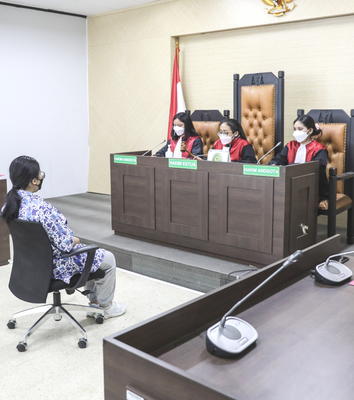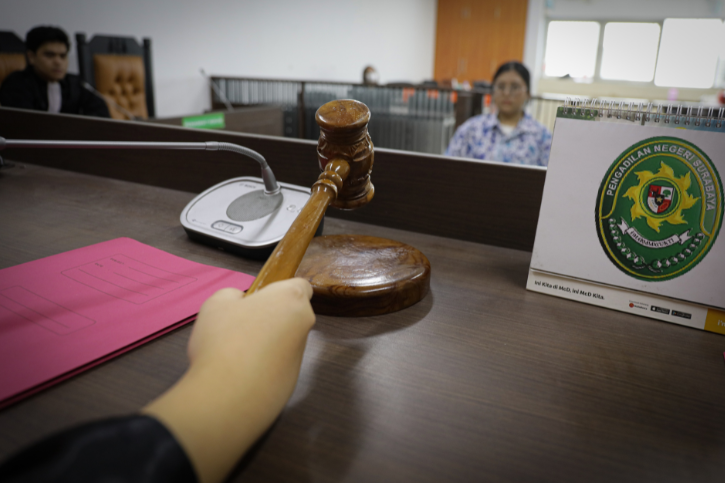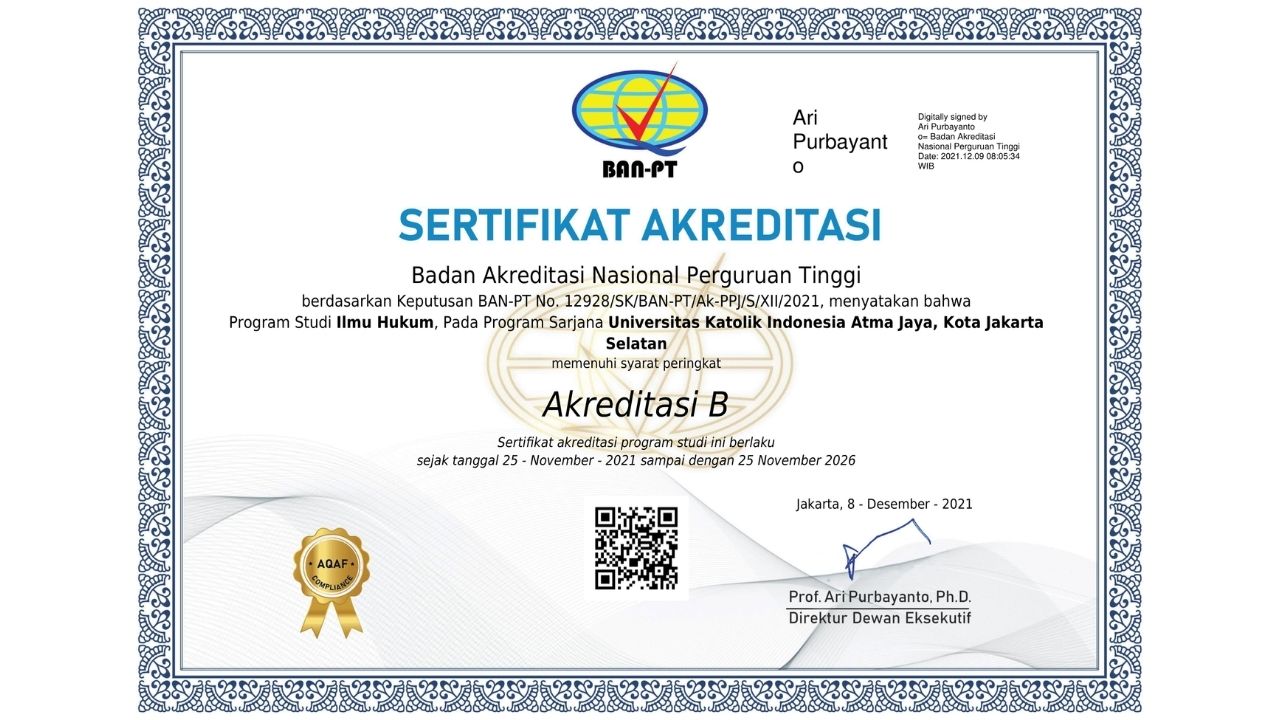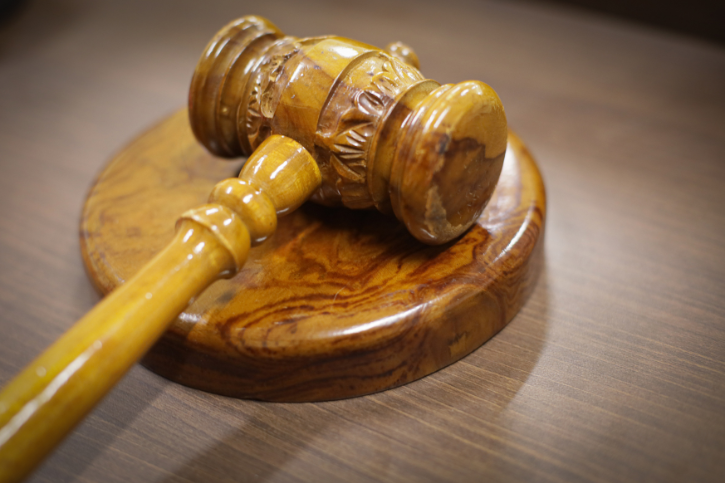
ASK
ME

REGISTER
NOW

The mission of the Law Study Program is to provide education in the discipline of law at the undergraduate level, particularly in the field of economics and business, in accordance with the National Standards of Higher Education.


SYARAT UJIAN KOMPREHENSIF
|
ACTIVITY 1ST INTERNATIONAL CONFERENCE ON CURRRENT LEGAL ISSUE AND HUMAN SECURITY (ICLHS) |
|
ACTIVITY 2ST INTERNATIONAL CONFERENCE ON CURRRENT LEGAL ISSUE AND HUMAN SECURITY (ICLHS) (ONLINE) |
ABOUT PARTICIPATION CREDIT UNIT (SKP)
The Participation Credit Unit (SKP) at the Faculty
of Law, Atma Jaya Catholic University of Indonesia (UNIKA ATMA JAYA) is a
system designed to recognize and assess student participation and contribution
in activities that support personality and ability development. This SKP
becomes an important part of the university curriculum and serves as
recognition of non-academic learning carried out by students. The following is
a further explanation of the meaning and benefits of SKP:
Definition of Participation Credit Unit (SKP)
Participation Credit Unit (SKP) Benefits
Thus, SKP at the Faculty of Law of UNIKA ATMA JAYA
not only supports formal learning but also provides space for students to grow
and develop in other important aspects of their personal and professional
development. This demonstrates the university's commitment in forming graduates
who not only excel academically but are also competent and ready to face
challenges in the professional world.
PEMINATAN PROGRAM STUDI HUKUM
SPECIALIZATION IN THE LAW STUDY PROGRAM
|
Peminatan |
Mata
Kuliah Peminatan |
|
Peminatan Hukum Internasional International Law Department |
Hukum Laut Internasional International Law of the Sea |
|
Hukum Diplomatik dan Konsuler Diplomatic and Consular Law |
|
|
Hukum Organisasi Internasional International Organization Law |
|
|
Hukum Humaniter Internasional International Humanitarian Law |
|
|
Hukum Lingkungan Internasional International Environmental Law |
|
|
Hukum Udara dan Ruang Angkasa Air and Space Law |
|
|
Peminatan Hukum Kenegaraan Constitutional Law Department |
Kapita Selekta Hukum Tata Negara Selected Papers on Constitutional Law |
|
Lembaga-Lembaga Negara Political Institutions |
|
|
Hukum Konstitusi Constitutional Law |
|
|
Hukum Acara di Mahkamah Konstitusi Procedural Law in the Constitutional Court |
|
|
Sistem Pemerintahan Indonesia Indonesian Government System |
|
|
Hukum Pemilu Election Law |
|
|
Peminatan Hukum Perdata Head of the Civil Law Department |
Hukum Jaminan Collateral Law |
|
Hukum Pembuktian dan Daluwarsa Law of Evidence and Expiration |
|
|
Hukum Pembiayaan Finance Law |
|
|
Hukum tentang Perbuatan Melawan Hukum Tort Law |
|
|
Kapita Selekta Hukum Perdata Selected Papers on Civil Law |
|
|
Hukum Perikatan Bersumber Perjanjian Law of Obligations |
|
|
Peminatan Hukum Ekonomi dan Bisnis Head of the Economic and Business Law Department |
Hukum Kepailitan Bankruptcy Law |
|
Hukum Pasar Modal Capital Market Law |
|
|
Hukum Perdagangan Internasional & Regional International and Regional Trade Law |
|
|
Hukum Penanaman Modal Investment Law |
|
|
Legal Memorandum & Legal Due Dilligence |
|
|
Hukum Jaminan Collateral Law |
|
|
Peminatan Hukum Pidana Head of the Criminal Law Department |
Kriminologi Criminology |
|
Hukum Penitensier Penitentiary Law |
|
|
Hukum Pidana Internasional International Criminal Law |
|
|
Hukum Narkotika Law on Narcotics |
|
|
Viktimologi Victimology |
|
|
Tindak Pidana Korupsi Criminal Offense of Corruption |
|
Legal Writing Guidelines |
Download |
|
Technical Guidelines for Legal Writing |
Download |
LEARNING OUTCOMES OF STUDY PROGRAM GRADUATES
No. | Learning Outcomes of Undergraduate Law Study Program Graduates of Universitas Katolik Indonesia Atma Jaya | Learning Outcomes of Law Graduates Based on National Higher Education Standards | |
SLO 1 | Able to apply attitudes in carrying out tasks based on the values of Pancasila, namely devotion to God Almighty, upholding human values, having nationalism, and appreciating diversity to improve the quality of life in society, nation, and state. | S1 | Pious to God Almighty and able to demonstrate a religious attitude; |
S2 | Uphold human values in carrying out duties based on religion, morals and ethics; | ||
S3 | Contribute to improving the quality of life in society, nation, state, and civilization based on Pancasila; | ||
S4 | Play a role as a citizen who is proud and loves the country, has nationalism and a sense of responsibility to the state and nation; | ||
S5 | Respect the diversity of cultures, views, religions and beliefs, as well as the original opinions or findings of others; | ||
SLO 2 | Able to apply a responsible attitude to work by internalizing norms, academic ethics, and Christian, Excellent, Professional, Caring values. | S6 | Work together and have social sensitivity and concern for the community and environment; |
S7 | Law-abiding and disciplined in social and state life; | ||
S8 | Internalize academic values, norms and ethics; | ||
S9 | Demonstrate an attitude of responsibility for work in their field of expertise independently; | ||
S10 | Internalize the spirit of independence, struggle, and entrepreneurship; | ||
S11 | Internalize the spirit of Christianity, excellence, professionalism, and caring. | ||
SLO 3 | Able to apply science logically, critically, systematically, and innovatively independently or in groups, with quality, and responsibly in accordance with technological developments and humanities values. | KU1 | Able to apply logical, critical, systematic, and innovative thinking in the context of developing or implementing science and technology that pays attention to and applies humanities values in accordance with their field of expertise. |
KU2 | Able to demonstrate independent, quality, and measurable performance. | ||
KU3 | Able to study the implications of the development or implementation of science and technology that pay attention to and apply humanities values in accordance with their expertise based on scientific principles, procedures and ethics in order to produce solutions, ideas, designs or art criticism. | ||
SLO 4 | Able to make decisions appropriately and compile them in the form of a written report, thesis, or final project report based on the results of information and data analysis. | KU4 | Compile a scientific description of the results of the study above in the form of a thesis or final project report, and upload it on the college website. |
KU5 | Able to make appropriate decisions in the context of problem solving in their field of expertise, based on the results of information and data analysis. | ||
SLO 5 | Able to maintain and develop work networks, and be responsible for the achievement of these work results | KU6 | Able to maintain and develop work networks with supervisors, colleagues, peers both within and outside the institution. |
KU7 | Able to be responsible for the achievement of group work results and supervise and evaluate the completion of work assigned to workers under their responsibility. | ||
SLO 6 | Able to conduct self-evaluation of his/her work and document it responsibly. | KU8 | Able to conduct a self-evaluation process of the work group under his responsibility, and able to manage learning independently. |
KU9 | Able to document, store, secure, and retrieve data to ensure validity and prevent plagiarism. | ||
SLO 7 | Able to compile ideas or concepts for solving legal problems orally and/or in writing through the application of juristic thinking methods and communicate them within the scope of the academic community, in accordance with academic ethics. | KK1 | Able to develop concepts for solving legal problems or cases through the application of juristic thinking methods based on theoretical knowledge of sources, principles, principles, and legal norms from various fields of Indonesian Positive Law, which are basic skills for carrying out the legal profession. |
KK2 | Able to formulate ideas logically, critically, and argumentatively in the field of Indonesian Positive Law and communicate them orally and/or in writing, especially within the scope of the academic community, in accordance with academic ethics. | ||
SLO 8 | Able to make decisions academically, independently, and responsibly in solving legal problems or cases by considering justice, ethics, compliance with the law, and concern for the social environment. | KK3 | Able to make decisions academically, independently and responsibly in solving legal problems or cases, and able to cooperate with peers. |
KK4 | Able to be ethical, fair, law-abiding, sensitive, and caring to the social environment in designing and applying law. | ||
CPL 9 | Able to master theoretical concepts about legal science, legal norms, legal sources, legal principles, legal history, legal systems, as well as basic concepts about legal philosophy, sociology, Indonesian Positive Law, and international law in order to understand law contextually, systemically, and as a whole. | P1 | Mastering theoretical concepts about: |
a. the nature, structure, and theory of Legal Science; | |||
b. sources, principles and norms of law; | |||
c. the Indonesian national legal system and its historical development. | |||
P2 | Mastering basic concepts about the history and theoretical aspects of the field of Indonesian Positive Law, which at least includes Civil Law, Criminal Law, State Administration Law, International Law, Customary Law, Islamic Law, both material or substantial and formal or procedural aspects. | ||
P5 | Mastering the general concepts of knowledge of legal philosophy, legal sociology, and comparative law in order to understand law contextually, systemically, and completely. | ||
SLO 10 | Able to master the application of logical and critical legal research and discovery methods which are the basis for the formulation of elementary legal documents, namely at least in the form of legal memorandum documents, legal documents for lawyers, contract legal documents, and legal documents that function regulatively such as company regulations and beschikking. | P3 | Mastering the concepts of the principles and steps of solving legal problems or cases through the application of legal discovery methods, which are the basis for the formulation of several forms of elementary legal documents, namely at least in the form of legal memorandum documents, legal documents for lawyers, contract legal documents, and legal documents that function regulatively such as company regulations and beschikking. |
P4 | Mastering basic concepts of legal research methods using logical and critical thinking methods. | ||

